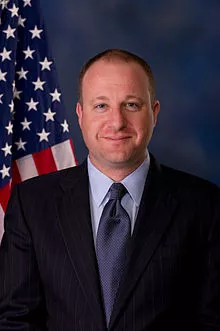On March 30, Representative Jared Polis reintroduced the Regulate Marijuana Like Alcohol Act, as colleagues introduced four other measures in the U.S. House of Representatives that would protect states with legal marijuana from threatened action by the Trump administration.
Under the Obama administration, the Department of Justice followed the 2013 Cole Memo, which essentially protected states with legalized medical or recreational marijuana from federal interference. When Polis originally introduced the Regulate Marijuana Like Alcohol Act in 2015, it did not pass — perhaps in part because states with legal marijuana did not feel threatened.
Today they do. In response to concerns about the Trump administration's stance on marijuana, Congress recently created the Cannabis Caucus, of which Polis is a founding member. And both Republicans and Democrats representing states with legalized marijuana are getting serious about protecting their constituents.
Along with Polis's bill, on March 30 senators and representatives introduced several other bipartisan measures for cannabis reform: Senator Michael Bennet and four co-sponsors introduced the Small Business Tax Equity Act of 2017. Senator Ron Wyden and Representative Earl Blumenauer, both from Oregon, which has legalized marijuana, introduced the Responsibly Addressing the Marijuana Policy Gap (RAMP) Act. Blumenauer also introduced the Marijuana Tax Revenue Act, and Wyden introduced the Marijuana Revenue and Regulation Act in their respective chambers.
Polis has been at the forefront of the marijuana movement in Congress, working with other lawmakers to pass legalization on a national level. Coloradans voted to approve legal recreational use in 2012; they'd approved medical marijuana twelve years earlier.
"Colorado has proven that allowing responsible adults to legally purchase marijuana gives money to classrooms, not cartels; creates jobs, not addicts; and boosts our economy, not our prison population," Polis said in a statement. "Now, more than ever, it is time we end the federal prohibition on marijuana and remove barriers for states that have chosen to legalize marijuana. This budding industry can't afford to be stifled by the Trump administration and its mixed messages about marijuana. The cannabis industry, states and citizens deserve leadership when it comes to marijuana."
Leaders in Colorado's marijuana industry have also been rattled by the Trump administration's unclear stance on marijuana; many think congressional action is the best way to prevent conflict between the states and federal agencies.
"The Trump administration's casual approach to governance creates tremendous uncertainty in the cannabis industry, and in many other industries, but at the end of the day the GOP has staked its reputation on states' rights, and we believe Congress will serve as an effective check against the ill-informed moral crusade threatened by Attorney General Sessions and Mr. Spicer," says Micah Tapman, partner and managing director of Canopy. "The best chance of stopping the DOJ from overstepping its enforcement boundaries is to expand on congressional initiatives like the Rohrabacher-Farr amendment that prohibited federal spending that violates states' rights with regard to medical cannabis and industry enforcement."
With California legalizing the recreational use of marijuana, Tapman adds, Colorado should have more allies at the federal level.
When we spoke with Representative Ed Perlmutter earlier this year, he said he expects California legislators to play a significant role in ending the federal marijuana prohibition. Industry leaders in California agree, and say they hope the millions of jobs the industry has created will sway the Trump administration.
"Cannabis legalization has already created hundreds of thousands of new jobs, many in the manufacturing sector. As the Trump administration learns more about the potential for job creation, I believe they will embrace this movement," says Ron Gershoni, co-founder of Jetty Extracts, a California-based concentrates company.
Polis's proposed legislation would remove cannabis from the Controlled Substances Act, helping to foster that job creation. It would essentially allow the Drug Enforcement Administration to treat marijuana and alcohol similarly.
Max Simon, CEO of Green Flower Media, says that if lawmakers are hesitant to pass such a bill, it's likely because of a lack of understanding. "The problem with the current administration is that they are still using very old, outdated information about cannabis to drive public policy," he explains. "The evidence shows that cannabis legalization drops teen use, lowers opiate fatalities, and has the same dependency rate as coffee."
Senator Wyden is planning to incorporate Polis's bill into a larger legislative package he'll present in the Senate. On May 3, Polis will host a series of conversations titled "The Marijuana Big Thinker Talk" at the Rayburn House Office Building in Washington, D.C., from 8:30 a.m. to 1:30 p.m.
[
{
"name": "Air - MediumRectangle - Inline Content - Mobile Display Size",
"component": "12017618",
"insertPoint": "2",
"requiredCountToDisplay": "2",
"watchElement": ".fdn-content-body",
"astAdList": [
{
"adType": "rectangle",
"displayTargets": "mobile"
}
]
},{
"name": "Editor Picks",
"component": "17242653",
"insertPoint": "4",
"requiredCountToDisplay": "1",
"watchElement": ".fdn-content-body",
"astAdList": [
{
"adType": "rectangle",
"displayTargets": "desktop|tablet"
},{
"adType": "rectangle",
"displayTargets": "desktop|tablet|mobile"
}
]
},{
"name": "Inline Links",
"component": "18838239",
"insertPoint": "8th",
"startingPoint": 8,
"requiredCountToDisplay": "7",
"maxInsertions": 25
},{
"name": "Air - MediumRectangle - Combo - Inline Content",
"component": "17261320",
"insertPoint": "8th",
"startingPoint": 8,
"requiredCountToDisplay": "7",
"maxInsertions": 25,
"watchElement": ".fdn-content-body",
"astAdList": [
{
"adType": "rectangle",
"displayTargets": "desktop|tablet"
},{
"adType": "rectangle",
"displayTargets": "desktop|tablet|mobile"
}
]
},{
"name": "Inline Links",
"component": "18838239",
"insertPoint": "8th",
"startingPoint": 12,
"requiredCountToDisplay": "11",
"maxInsertions": 25
},{
"name": "Air - Leaderboard Tower - Combo - Inline Content",
"component": "17261321",
"insertPoint": "8th",
"startingPoint": 12,
"requiredCountToDisplay": "11",
"maxInsertions": 25,
"watchElement": ".fdn-content-body",
"astAdList": [
{
"adType": "leaderboardInlineContent",
"displayTargets": "desktop|tablet"
},{
"adType": "tower",
"displayTargets": "mobile"
}
]
}
]













